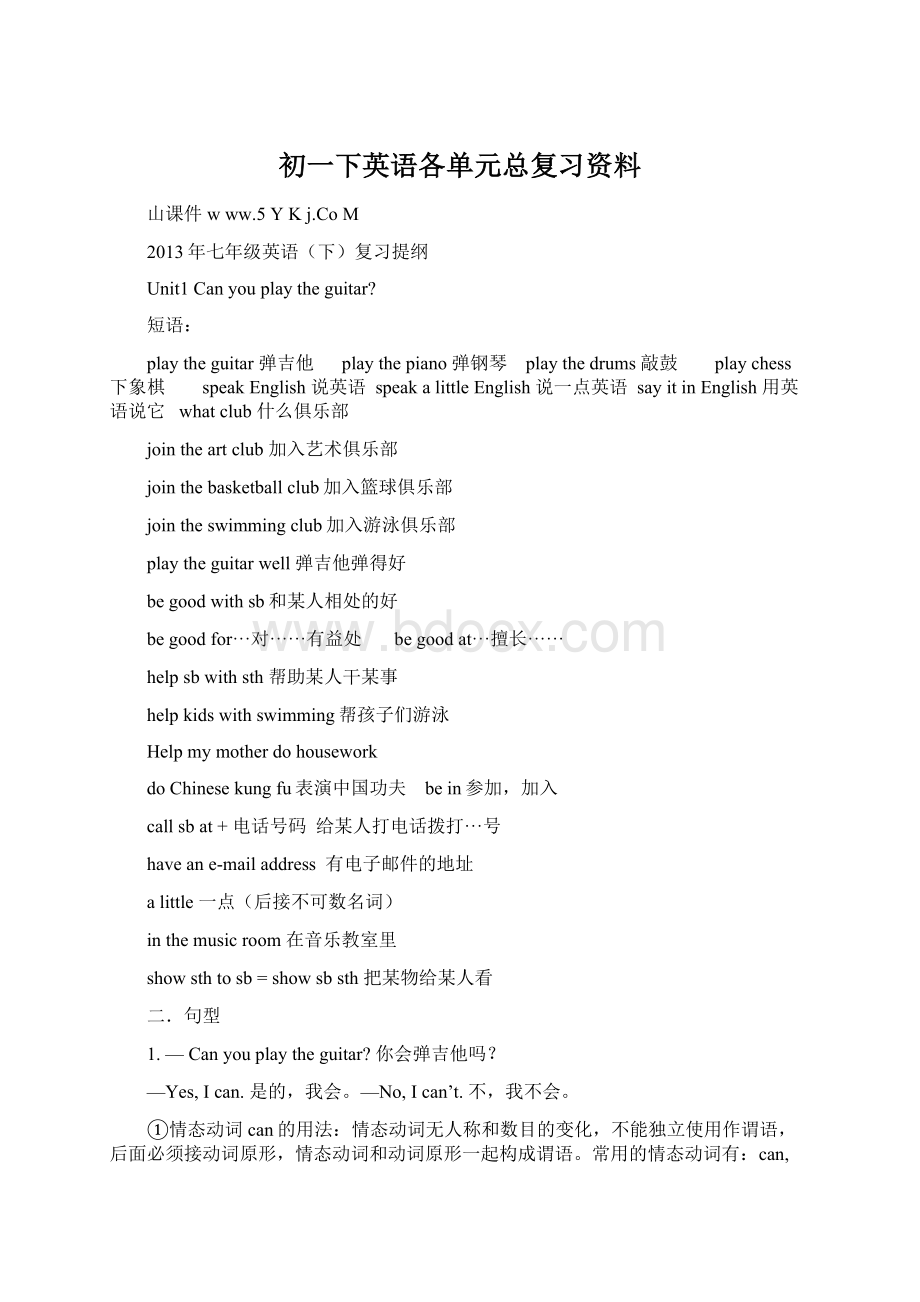初一下英语各单元总复习资料Word文档下载推荐.docx
《初一下英语各单元总复习资料Word文档下载推荐.docx》由会员分享,可在线阅读,更多相关《初一下英语各单元总复习资料Word文档下载推荐.docx(21页珍藏版)》请在冰豆网上搜索。

—Yes,Ican.是的,我会。
—No,Ican’t.不,我不会。
①情态动词can的用法:
情态动词无人称和数目的变化,不能独立使用作谓语,后面必须接动词原形,情态动词和动词原形一起构成谓语。
常用的情态动词有:
can,may,must,need。
含情态动词的句子一般疑问句是把情态动词提到句首,否定句是在情态动词后加not。
②playtheguitar“弹吉他”,play后加乐器名词时,乐器名词前要加the,“play+the+乐器”表示“弹奏某种乐器”。
play后加球类名词时,球类名词前不加the,“play+球类名词”表示“踢、打某种球”。
2.CanyouspeakEnglish?
你会说英语吗?
speakEnglish“说英语”,“speak+语言”表示“说某种语言”。
sayitinEnglish“用英语说它”,如:
CanyousayitinEnglish?
3.Iwanttojointheartclub.我想加入艺术俱乐部。
(1).join是动词,意为“参加,加入”,后面接表示团体、俱乐部或组织的词作宾语,意为“加入某种团体、俱乐部或组织,并成为其中的一员”。
①若想表示加入某项活动、聚会、比赛等时,要加介词in。
②join还可以用于“joinsb(indoingsth)”结构中,意为“加入到某人中(一起做某事)”。
(2).对俱乐部的名称进行提问时,疑问词用Whatclub,如:
Iwanttojointheartclub.对划线部分进行提问时,答案是:
Whatclubdoyouwanttojoin?
4.Whatcanyoudo?
你会干什么?
Whatcanyoudo?
是对主语会干的动作进行提问。
如:
Hecanplaythepiano.(对划线部分进行提问)答案是:
Whatcanhedo?
5.Areyougoodwithkids?
你和孩子们相处的好吗?
begoodwithsb意为“和某人相处的好”,begoodfor·
意为“对·
有益处”,begoodat·
意为“擅长·
”
6.Comeandjoinus!
来加入我们吧!
Comeandjoinus!
是祈使句,以动词原形开头。
come和join是并列关系,用连词and相连。
7.Canyouhelpkidswithswimming?
你能帮助孩子们游泳吗?
helpsbwithsth/doingsth意为“帮助某人干某事”
8.MusiciansWantedforSchoolMusicFestival为学校的音乐节招聘音乐家
职业名词+wanted表示“招聘·
9.Canyouplaythepiano,thetrumpet,thedrumsortheguitar?
你会弹钢琴、吹喇叭、敲鼓还是会弹吉他?
这是一个选择疑问句,并列的选项用or连起来,选择疑问句不能用Yes或No回答,只能答其中的一个选项。
—AreyouinClass1orClass2?
—I’minClass1./I’minClass2.
10.Wewanttwogoodmusiciansforourrockband.我们想为我们的摇滚乐队招聘两个音乐家。
forourrockband意为“为我们的摇滚乐队“
11.IcandoChinesekungfu.我会表演中国功夫。
doChinesekungfu意为“表演中国功夫”,其中的do是实意动词。
12.Youcanbeinourschoolmusicfestival.你可以参加我们学校的音乐节。
bein意为“参加,加入”
13.PleasecallZhangHengat622-6033.请给张恒打电话拨打622-6033。
callsbat+电话号码意为“给某人打电话拨打·
14.What’syouraddress?
你的地址在哪里?
问“你的地址在哪里?
”疑问词是what而不是where.如:
What’syoure-mailaddress?
15.Canyouplaytheguitarwell?
你弹吉他会弹得很好吗?
playtheguitarwell“弹吉他弹得好”,well是good的副词,用来修饰实义动词play,修饰实义动词要用副词。
16.Comeandshowus.来出示给我们看。
showsthtosb=showsbsth“把某物给某人看”如:
Showyourphototome.=Showmeyourphoto.
Unit2Whattimedoyougotoschool?
一.词组:
1.“goto+名词”表示去做某事:
gotoschool去上学
gotobed去睡觉
gotowork去上班
2.getup起床getdressed穿衣takeashower=haveashower洗淋浴brush(one’s)teeth刷牙
3.频度副词:
always>
usually>
often>
sometimes>
never
always与never互为反义词
4.“so+形容词”表示如此…,那么….soearly如此早sobeautiful那么漂亮
5.“after+名词”表示…之后:
afterbreakfast早饭后afterclass下课后afterschool放学后afterwork下班后afterthat在那之后
6.job名词,可数.aninterestingjob一份有趣的工作
twojobs两份工作
work不可数名词,Ihavemuchworktodo.我有大量作业要做。
7.“from…to…”表示从…到…,可指时间,也可指地点
8.inthemorning在早晨,在上午intheafternoon在下午intheevening在晚上atnight在晚上
9.atabouttenthirty在大约10:
30about=around大约、大概
10.“belatefor…”表示做某事迟到了。
belateforschool/work/class
例句:
I’mlateforschool.
Don’tbelateforwork.
11.onschooldays在上学日
theSchoolDay
校庆日
12.时间表达法:
1直接表达
如:
6:
15
sixfifteen
11:
30
eleventhirty
12:
55
twelvefifty-five
2
间接表达,如果分钟数少于等于30分钟用past,如果多于30分钟用to
15aquarterpastsix
halfpasteleven
fivetotwelve
13.liketodosth=likedoingsth.喜欢做某事
14.much&
many
“much+不可数名词”“many+可数名词复数”表示大量的某物
15.“for+一段时间”表示持续多长时间
halfanhour/for3years/for1day
16.“when+事件”表示当…的时候
whenIgotoschool/whenIeatbreakfast
17.“either…or…”表示要么…要么…用于连接两个性质相同的词或短语
18.“begoodfor…”表示对…有好处。
二.句式:
1.1whattime引导的询问时间的句型(答语要用具体的时间点)
—Whattimedoyougetup?
—Igetupatsixo’clock.
—Whattimeisit?
—It’seightthirty.
2when引导的询问时间的句型(回答的时间可以具体,也可以范围比较大)
—Whendopeopleusuallyeatdinner?
—Peopleusuallyeatdinnerintheevening.
3询问现在的时间
Whattimeisit?
==What’sthetime?
2.含有always的句子变否定句时,将always换成never即可。
He’sneverlate变否定句:
He’salwayslate.
TheyalwaysspeakEnglish.变否定句:
TheyneverspeakEnglish.http:
//www.xkb1.com
补充
一.短语:
1.befrom=comefrom
来自于----2.livein居住在---3.onweekends在周末
4.writetosb=writealettertosb给某人写信;
写信给某人5.intheworld在世界上
6.inChina
在中国7.penpal笔友8.14yearsold
14岁 9.favoritesubject最喜欢的科目10.theUnitedStates美国 theUnitedKingdom英国 NewYork纽约11.speakEnglish讲英语 likeanddislike爱憎
12.gotothemovies去看电影 playsports做运动二.重点句式:
1.Ilikegoingtothemovieswithmyfriendsandplayingsports.我喜欢和我的朋友们一起去看电影,做运动。
2Wheredoeshelive?
他住在哪里?
3Whatlanguage(s)doeshespeak?
他会说什么语言?
4IwantapenpalinChina.我想交一个中国的笔友。
5IcanspeakEnglishandalittleFrench.
我会说英语和一点法语。
6Pleasewriteandtellmeaboutyourself.
请写信告诉我关于你自己。
7Canyouwritetomesoon?
你可以马上给我回信吗?
三.本单元的国家,人民、语言对应。
1Canada----Canadian----English/French
2France------French------French
3Japan------Japanese----Japanese
4Australia----Australian-----English
5theUnitedStates------American----English
6theUnitedKingdom---British-----English
Unit3Howdoyougettoschool?
一.
Askingways:
(问路)
1.
Whereis(thenearest)……?
(最近的)……在哪里?
2.
Canyoutellmethewayto……?
你能告诉我去……的路吗?
3.
HowcanIgetto……?
我怎样到达……呢?
4.
Isthere……nearhere/intheneighborhood?
附近有……吗?
5.
Whichisthewayto……?
哪条是去……的路?
二.Showingtheways:
(指路)
1.Gostraightdown/alongthisstreet.沿着这条街一直走。
2.Turnleftatthesecondturning.在第二个路口向左转。
3.Youwillfinditonyourright.你会在你右手边发现它。
4.Itisaboutonehundredmetresfromhere.离这里大约一百米远。
5.You’dbettertakeabus.你最好坐公交车去。
(You’dbetter+动词原形)
三.词组
1.acrossfrom……在……的对面
acrossfromthebank
在银行的对面2.nextto……
紧靠……
nexttothesupermarket
紧靠超市3.between……and……
在……和……之间betweentheparkandthezoo
在公园和动物园之间among表示位于三者或三者以上之间4.infrontof……在……前面
Thereisatreeinfrontoftheclassroom.课室前面有棵树。
inthefrontof……在……(内)的前部
Thereisadeskinthefrontoftheclassroom.
课室内的前部有张桌子。
5.behind……在……后面
behindmyhouse在我家后面6.turnleft/right向左/右拐ontheleft/rightof……在某物的左/右边
ontheleftofourschool在我们学校的左边
onone’sleft/right
在某人的左/右边
onmyleft在我左边7.gostraight一直走
8.down/along……沿着……(街道down/alongCenterStreet沿着中央街9.intheneighborhood=nearhere
在附近
10welcometo……欢迎来到……11.take/haveawalk散步
12.thebeginningof……
……的开始,前端
atthebeginningof……在……的开始,前端
inthebeginning起初,一开始13.havefun=haveagoodtime=enjoyoneself
玩得开心,过得愉快我昨天玩得很开心。
Ihadfunyesterday.=Ihadagoodtimeyesterday.
=Ienjoyedmyselfyesterday.14.haveagoodtrip旅途愉快
15.takeataxi坐出租车16.到达:
getto+地方 gethere/there/home到这/那/家
arrivein+大地方IarriveinBeijing.
arriveat+小地方Iarriveatthebank.
reach+地方
17.goacross从物体表面横过goacrossthestreet横过马路gothrough从空间穿过
gothroughtheforest穿过树林18.on+街道的名称。
Eg:
onCenterStreet
at+具体门牌号+街道的名称
at6CenterStreet
四.重难点解析
1.enjoydoingsth
享受做某事的乐趣,喜爱做某事
Ienjoyreading.我喜爱读书。
到目前为止,我们学了两个特殊的动词finish和enjoy,都是要带doing.
Ifinishcleaningtheroom.
我扫完了这间屋子。
2.hopetodosth
希望做某事
Ihopetopassthisexam.
我希望通过这次考试。
hope+从句Ihopetomorrowwillbefine.我希望明天将会晴朗。
wishtodosth3.if引导一个表示假设的句子。
IfIhavemuchmoney,Iwillgotothemoon.如果我有许多钱,我就会去月球。
Ifyouarehungry,youcanbuysomefoodinthesupermarket.如果你饿了的话,你可以在超市买一些食物。
Unit4Don'
t
eat
in
class.
一.短语.
1.
class
在课上 2.
on
school
nights
在上学的晚上 3.
rules
校规
4.
no
talking
禁止交谈 5.
listen
to
music
听音乐 6.
have
不得不
7.
take
my
dog
for
a
walk
带狗去散步8.
outside
在外面吃饭
9.
the
hallway
在走廊上 10.
wear
uniform
穿制服 11.
arrive
late
上学迟到 12.
after
放学后 17.
be
bed
在床上 13.
practice
guitar
练习弹吉它
14.
help
mom
make
dinner
帮助我妈做饭15.
meet
friends
和我朋友见面16.
by
ten
o'
clock.十点之前 18.
Children'
s
Palace
少年宫
二.重点句型
1.Don’tarrivelateforschool=Don’tbelateforschool
2.Don’tfight=Nofight
3.Don’tlistentomusicintheclassroom.
4.Don’truninthehallways
5.Don’tsmoke.It’sbadforyourhealth.
6.Don’tplaycardsinschool
7.Don’ttalkin8.Don’t=Notalking
8.watchTVonschoolnights.
9.Don’t
sleep
in
class.
10.Don’t
play
sports
theclassroom.
11.Don’tsingsongsatnight.
12.Don’ttalkwhenyoueat.
13.Don’twearhatsinclass.
14.Do
homeworkby10:
00.
15.Cleanyourhouse!
16.Makethebed.
17.Canwe……?
Yes,wecan.
No,wecan’t.
Eg:
Canwearrivelateforclass?
No,wecan’t.Wecan’tarrivelateforclass.
18.Doyouhavetowashyourclothes?
Yes,Ido./No,Idon’t.
三.
重难点解析:
情态动词have
的用法,意思是"
必须、不得不"
,它侧重于客观上的必要和外界的权威。
(1)结构:
主语+have
to+动词原形+其他
(一般现在时,主语是第三人称单数时,用has
to;
句子是过去时,用had
to.)
We
sneakers
gym
在体育课上,我们必须穿运动鞋。
Tom
has
every
day.
汤姆每天必须练习弹吉它。
I
had
get
up
at
5:
00
am
l